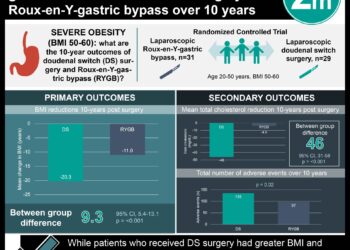Differences in cardiovascular health between sexual minorities and heterosexual adults
1. Bisexual women tended to have worse health profiles, including body mass index and overall cardiovascular health profile, than heterosexual women.
2. Gay men tended to have better health profiles, including diet and glycemic index scores, than heterosexual men.
Level of Evidence Rating: 2 (Good)
Study Rundown: Cardiovascular disease is a leading cause of death worldwide. Despite its commonness, many studies of cardiovascular health and outcomes have been performed mainly on a population of middle-aged, heterosexual, White males, leaving much unknown about patterns of disease in most other populations. Recent studies have demonstrated that sexual minority individuals may be at greater risk of adverse cardiovascular events than heterosexual adults, likely due to unique health stressors secondary to discrimination. This study sought to evaluate differences in overall cardiovascular health (CVH) between heterosexual and sexual minority adults in the United States.
In total, 12,180 participants were included, and the analysis was sex-stratified. Compared with heterosexual females, bisexual females were younger, more likely to meet the criteria for depression and less likely to have hypertension. Compared with heterosexual males, sexual minority males were more likely to meet the criteria for depression and to meet criteria for economic poverty than heterosexual males. Gay males had better health scores for diet, glycemic index and blood pressure than heterosexual males. Finally, bisexual females were more likely to meet the criteria for obesity than their heterosexual counterparts.
This cross-sectional study by Caceres et al. identified disparities in CVH risks and outcomes between heterosexual and sexual minority adults in the United States. These findings are consistent with the study’s hypothesis that gay men would have the most favourable CVH profile and that sexual minority females would have worse overall CVH than heterosexual females. A strength of this study was the large sample size, which allowed for identifying these patterns of health and lifestyles amongst minority populations. However, causality cannot be interpreted from this study as it is limited by its cross-sectional nature and self-reported data. Further study should seek to determine the cultural or biological factors that drive these patterns of disparity and which targeted solutions can be implemented to overcome gaps in care.
Click here to read this study in JAMA Cardiology
Relevant reading: Impact of sex differences and diabetes on coronary atherosclerosis and ischemic heart disease
In-Depth [cross-sectional study]: A large, cross-sectional study was performed between June and December 2022. Publicly available data from the National Health and Nutrition Examination Survey database were collected. Most data were self-reported, including sexual orientation, dietary history, and smoking use; objective data from physical exams were also available. Cumulative ideal cardiovascular health scores were calculated using the methodology described in detail in the manuscript.
Compared with heterosexual females, bisexual females were younger (mean [standard deviation] age, 31.0 [9.6] years vs 40.5 [11.6] years), more likely to meet criteria for depression (47.60% vs 26.70%), and less likely to have hypertension (6.60% vs 16.10%). Compared with heterosexual males, sexual minority males were more likely to meet the criteria for depression (36.50% vs 19.00%) and to meet the criteria for economic poverty than heterosexual males (family income to poverty ratio 2.3 vs 3.1). Gay males had better health scores (out of 100) for diet (mean score 50.8 [27.6] vs 38.3 [30.9];P= .004), glycemic status (93.4 [15.6] vs 88.4 [22.4]; P = .03) and blood pressure than did heterosexual males (79.2 [21.6] vs 75.4 [25.3]; P = .20). Finally, bisexual females were more likely to have obesity (adjusted odds ratio, 1.52; 95% confidence interval 1.10-2.10).
Image: PD
©2023 2 Minute Medicine, Inc. All rights reserved. No works may be reproduced without expressed written consent from 2 Minute Medicine, Inc. Inquire about licensing here. No article should be construed as medical advice and is not intended as such by the authors or by 2 Minute Medicine, Inc.







